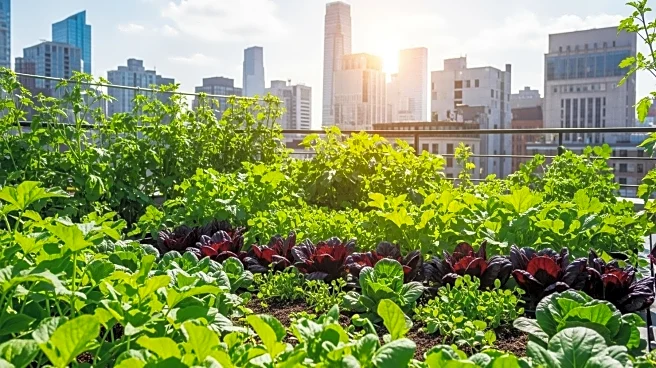What is the story about?
What's Happening?
Urban agriculture is being highlighted as a viable solution to address food security issues, particularly in the face of climate change. Historically, urban farming played a significant role during World War I and II in the United States, providing a substantial portion of the country's vegetable supply. Today, urban agriculture has evolved into a sophisticated practice involving vertical farming, indoor crop cultivation under LED lighting, and the use of artificial intelligence and smart technology to enhance productivity. Countries like China are leading the way in urban agriculture, with policies aimed at increasing food production through this method. The practice is seen as a way to mitigate the impacts of climate change on traditional farming, offering a sustainable and efficient alternative.
Why It's Important?
The significance of urban agriculture lies in its potential to provide a stable food supply amidst the challenges posed by climate change. As traditional farming faces disruptions due to unseasonal weather patterns, urban agriculture offers a resilient alternative that is less vulnerable to environmental fluctuations. This method not only promises higher productivity but also supports organic farming, which benefits human health and the environment. For countries like Pakistan, India, and Bangladesh, which are experiencing severe climate impacts, adopting urban agriculture could be crucial for ensuring food security and reducing the risks associated with climate change.
What's Next?
Countries affected by climate change, particularly in South Asia, are encouraged to learn from China's experience and develop policies to support urban agriculture. By prioritizing this practice, these nations can enhance their food security and protect against future crises. Policymakers are urged to revise agricultural policies to create favorable conditions for urban farming, drawing inspiration from successful models like China's. This strategic shift could help meet the growing food demands of rapidly increasing populations while safeguarding against climate-related disruptions.
Beyond the Headlines
Urban agriculture not only addresses immediate food security concerns but also represents a shift towards more sustainable and eco-friendly food systems. By promoting organic farming and reducing reliance on traditional agriculture, urban farming aligns with environmental conservation efforts. This approach can help reduce physical and mental stress associated with food insecurity, offering a holistic solution that integrates health, environmental, and economic benefits.














